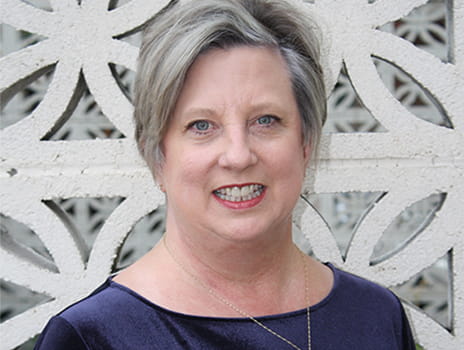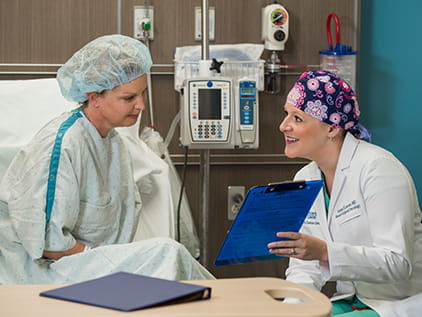- Home
- News Room
- Patient Stories Search Page
- Sharla Meisenheimer Both Lung and Breast Cancer A Double Diagnosis
August 13, 2019
With a family history of breast and lung cancer, Sharla Meisenheimer, of Manhattan, Kansas, has never taken her health for granted.
She’s been proactive about her health for 20 years, with annual physicals and mammogram screenings, which she began at age 30.
Two years ago, Sharla went in for her annual well-woman exam with Cynthia Mills, MD, her family medicine physician at the Hutchinson Clinic in Hutchinson, Kansas. During the breast exam, her physician discovered a lump and scheduled a mammogram. The mammogram revealed a suspicious spot, so Sharla had a biopsy. Then she heard the unwelcome words: You have breast cancer.
“Naturally, I was very concerned,” recalls Sharla. “I watched my sister fight an 18-year battle with breast cancer. She died from it at age 63. I wanted a different outcome.”
Dr. Mills referred her to Fadi Estephan, MD, a medical oncologist at the clinic. There, she learned that standard treatment for early-stage breast cancer would involve either a lumpectomy with radiation or a mastectomy. Both treatment plans would also include chemotherapy.
Dr. Estephan also recommended Sharla have genetic testing, which showed she did not carry the BRCA1 or BRCA2 gene mutation. Mutations in the BRCA1 or BRCA2 genes are the most common cause of hereditary breast cancer. Still, because of her family history, Sharla was strongly considering a bilateral (double) mastectomy. Her surgeon, Scott Clarke, MD, advised she have a PET scan and then decide how to proceed. PET scans can detect cancerous tissues and cells in the body that may not be identified through CT or MRI.
Two primary cancers
The PET scan delivered more upsetting news ̶ Sharla had a spot on her lung. And Sharla’s father had died of lung cancer. Sharla had a biopsy to determine if the abnormality was cancerous and, if so, whether it was breast cancer that had metastasized to the lung or an unrelated lung cancer. The results showed that Sharla had lung cancer.
In what was likely one of the scariest moments of her life, Sharla found herself facing 2 primary cancers. She was unsure how to proceed.
Dr. Estephan advised her to begin chemotherapy, which included standard chemotherapy as well as targeted treatment for HER2-positive breast cancer. After starting this, Sharla and Dr. Estephan together decided to seek a second opinion at The University of Kansas Cancer Center, the state’s only National Cancer Institute-designated cancer center. Sharla’s husband had received treatment at The University of Kansas Hospital several years earlier, so they were familiar with the level of quality care provided at an academic medical center.
An evolving care plan
During Sharla’s first visit to The University of Kansas Cancer Center, she met with breast medical oncologist Qamar Khan, MD. Dr. Khan reviewed her medical history, continued her breast cancer treatment, and advised her to proceed with surgery (resection) to address the lung cancer.
Sharla next met with cardiothoracic surgeon Alykhan Nagji, MD, and his team to discuss surgically treating her lung cancer. Dr. Nagji recommended Sharla have a lung resection to remove the diseased part of her lung, and she agreed. Her lung resection was performed in August 2016.
Once she recovered from lung surgery, she resumed chemotherapy for breast cancer with Dr. Estephan in Hutchinson, who collaborated with her care team at the cancer center. Cancer center specialists often collaborate with private oncologists and cancer centers throughout the region for the convenience of patients.
“My care team at The University of Kansas Cancer Center worked so well with Dr. Estephan, my local oncologist,” she said. “This kind of teamwork simplified my life.”
Five months after her lung surgery, with chemotherapy behind her, Sharla took the next step to treat her breast cancer. She had a single (unilateral) mastectomy and the first step toward breast reconstruction. The procedures were performed simultaneously in January 2017 by breast surgical oncologist Jamie Wagner, DO, and breast reconstructive surgeon Julie Holding, MD, at The University of Kansas Cancer Center.
Sharla’s 2-step reconstruction process involved placing a breast tissue expander to slowly stretch the skin to prepare it for the placement of a permanent breast implant. The final step in her reconstruction process was completed 7 months after her initial breast surgery.
Life after cancer
During a follow-up appointment with Dr. Nagji, Sharla asked what she needed to do to ensure she did not become a repeat lung cancer patient.
“Go live your life,” he told her. “Don’t let this define you. You and I are going to be friends for the next 5 years while we monitor your health. If the lung cancer comes back, we will deal with it.”
Sharla took his advice to heart. “I interviewed for a job and changed careers while still undergoing chemotherapy,” she says. “I moved from Hutchinson to Manhattan. Now, 2 years later, I keep living my life.”
Positive prognosis
“Though Sharla had 2 different cancers, we caught them early because she stayed on top of her regular screenings,” says Dr. Nagji. “Her proactive approach to her health helped us give her the possibility of a better outcome.”
Dr. Khan concurs. “It might sound strange, but I believe one of the best things to happen to Sharla was her breast cancer diagnosis, because it led to the lung cancer diagnosis,” he says. “Today, she remains cancer-free and it’s unlikely either will come back.”
“Although this was a difficult time, I always felt a sense of ‘we have you’ from my care team at The University of Kansas Cancer Center,” says Sharla. “They made me feel as if I mattered. Now, if anyone tells me they have cancer, I tell them to go to The University of Kansas Cancer Center.”

